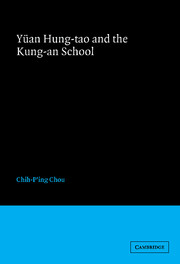Book contents
- Frontmatter
- Contents
- Preface
- 1 The literary scene before the rise of the Kung-an school
- 2 The literary theories of the three Yüan brothers
- 3 The poetry of Yüan Hung-tao
- 4 The prose of Yüan Hung-tao
- Epilogue: the legacy of the Kung-an school
- Notes
- The modern study of the three Yüan brothers and their Kung-an school: an introduction and select bibliography
- Chinese titles of works translated in chapters 3 and 4
- Glossary index
3 - The poetry of Yüan Hung-tao
Published online by Cambridge University Press: 30 October 2009
- Frontmatter
- Contents
- Preface
- 1 The literary scene before the rise of the Kung-an school
- 2 The literary theories of the three Yüan brothers
- 3 The poetry of Yüan Hung-tao
- 4 The prose of Yüan Hung-tao
- Epilogue: the legacy of the Kung-an school
- Notes
- The modern study of the three Yüan brothers and their Kung-an school: an introduction and select bibliography
- Chinese titles of works translated in chapters 3 and 4
- Glossary index
Summary
Yüan Hung-tao was not the most influential poet in the late Ming, but he certainly was one of the most controversial literary figures of the period. His works were banned in the Ch'ing dynasty and were considered heterodox and unconventional. He was held responsible for bringing about the decline of Ming poetry. This traditional criticism of Yüan Hung-tao was summed up by the editors of the Ssu-k'u ch'üan-shu tsungmu t'i-yao:
The poetry and prose [of the three Yüan brothers] redirected late Ming literature from the rigid and heavy (pan-chung) to the light and frivolous (ch'ing -ch'iao), from affectation (fen-shih) to originality (pen-se). They opened a new vista to the world, and they were in turn impetuously followed. The Seven Masters still rooted themselves in scholarship, while the three Yüan [brothers] relied totally on their wits. Those who followed the Seven Masters [committed the mistake of] merely imitating antiquity, and those who followed the three Yüan [brothers] reached the point of taking pride in their cleverness, violated the prosodic regulations, and ruined versification. In the name of correcting the errors of the Seven Masters, they committed even more serious errors.
Another grave accusation was lodged by Shen Te-ch'ien (1673–1769). He charged, in his Ming-shih pieh-ts'ai, that the three Yüan brothers were responsible for the deterioration of ‘moral education through poetry’ (shih-chiao) and had jeopardized the continuation of the Ming dynasty. Throughout the Ch'ing dynasty Yüan Hung-tao's poetry was regarded as ‘the sound of decadence’ (wang-kuo chih-yin; literally ‘the sound of the collapse of the state’) and as having presaged the ruin of the Ming.
- Type
- Chapter
- Information
- Yüan Hung-tao and the Kung-an School , pp. 70 - 90Publisher: Cambridge University PressPrint publication year: 1988

